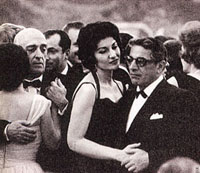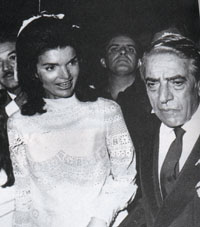The Greek Love Triangle: Aristotle Onassis, Jacqueline Kennedy & Maria Callas
 Maria Callas and Aristotle Onassis met on the third of September 1957, in Venice, at a party given in her honor by the famous American hostess, Elsa Maxwell, who was obsessed with, madly in love with, the diva. Callas was thirty-three and had been married for eight years to Giovanni Battista Meneghini. The two lived for her career. At the the time of this fated meeting with the wealthy Greek ship owner, Callas, who had battled weight-gain all her life, was slender, radiant, and a great star.
Maria Callas and Aristotle Onassis met on the third of September 1957, in Venice, at a party given in her honor by the famous American hostess, Elsa Maxwell, who was obsessed with, madly in love with, the diva. Callas was thirty-three and had been married for eight years to Giovanni Battista Meneghini. The two lived for her career. At the the time of this fated meeting with the wealthy Greek ship owner, Callas, who had battled weight-gain all her life, was slender, radiant, and a great star.
Onassis was immediately attracted. He extended several invitations to the couple to join him on his yacht, the Christina. Each time, his invitation was declined. The last invitation, a year-and-half after their introduction, was turned down because she was preparing to sing Medea at Covent Garden in London.
Not used to being rebuffed, Onassis went to London to the premiere of the opera on June 17, 1959. He also staged an elaborate post-performance reception for her at the Dorchester Hotel, decorating the rooms with thousands of red roses and inviting an impressive guest list including Winston Churchill, Gary Cooper, the Duchess of Kent and Douglas Fairbanks Jr. Callas remained apparently unimpressed by the grand gesture: she made only a very brief appearance that night, claiming to be exhausted from her performance. A month later, however, the couple accepted another Onassis invitation on a celebrity-packed cruise in the Mediterranean. Maria had a wonderful time. She sunbathed, rested, and was very charmed by her very charming host — so much so, that one night she uncharacteristically stayed up long after her husband had retired. After that, every night was a late night for Maria. Until one night she never returned to the cabin she shared with Meneghini. She had fallen.
The cruise lasted several weeks. When it ended on August 12th, the Callas-Meneghinis returned to Milan where she announced to her husband that she wanted to be alone. He left for the villa in Sirmione. Three days later, at Sirmione, the couple decided to separate. Two days after that, Onassis came for her.
Their relationship remained a secret only briefly. On September 3, 1958, exactly a year to the day they had met, they were spotted by journalists as they dined in a Milan restaurant. Later they were followed returning to their hotel.
Maria was overwhelmed by the relationship with Onassis, and by the press' attention to it. From the beginning, her life had been a struggle against the forces that fate presented to her at birth. Her talent was her savior but had required her complete devotion. Now, for the first time in her life, she was a woman in love. The experience completely distracted her emotionally and physically. Onassis captivated her. She decided to temporarily set her career aside. Wherever he went he would phone her. Wherever she went, he would fly to her side, sometimes even for as brief a time as a few minutes, so great was the passion they shared. Or so it seemed to Maria.
However, the intensity of the Greek's ardor soon began to diminish. Maria found the tables were turning; she had to follow him. She sold her apartment in Milan and moved to Paris, to be on the "Onassis route," which was London-Monte Carlo, in order to catch him as he passed by. She was seeing less and less of him. "I love Maria dearly," he said, "but we are just good friends." Stab.
In June of 1962, Maria was aboard the Christina, along with Lee Radziwill, sister of Jacqueline Kennedy. It was evident to all, including Maria, that Princess Radziwill was receiving special attention from the host. Later in the summer, Radziwill returned to the Christina with Jackie who, according to the White House press office, was convalescing after losing her son Patrick at birth.
Maria was outraged and wounded. She returned to Paris. The couple's relationship continued, nevertheless, although constantly interrupted by misunderstandings and altercations.
In March 1968, she called his bluff. "When are you going to marry me?" she demanded to know. He acceded and took her to London for the ceremony. However, she did not have her birth certificate, required for the marriage license, as it was in New York. By the time she received it a few days later, the couple were quarreling and Onassis' marital-intentions had cooled. The following August, on board the Christina, Onassis informed Maria that she would have to disembark, because he was expecting important visitors. Humiliated and devastated by her lover's disinvitation, she returned to Paris. The Important Visitor was none other than Jacqueline Kennedy. Not long after, Maria learned, along with the rest of the world, that Onassis was going to marry Mrs. Kennedy.
Maria was forty-five. She never recovered from her lover's betrayal. Over the next few years, she became a recluse in her Paris apartment at 36, rue Georges Mandel. She made a final concert tour of Europe, America, and Asia in 1973-74, but her voice had begun to fail her. She lived long enough to see the utter disintegration of the Onassis marriage as well as her lover's health, although it was small solace. Onassis died in 1975. Two years later, a little more than two months from her fifty-fourth birthday, Maria died in Paris. Of a broken heart.
Source: New York Social Diary.com
Onassis-Callas-Kennedy Love Triangle (Greek Fire book review)
 If you recall your Greek myths with some nostalgia, and are aware that many of these stories continue to recreate themselves in a modern-day setting, "Greek Fire" will challenge you to correlate the high dramas of ancient Greece to the 20th century events that surrounded Maria Callas, the operatic diva, and Aristotle Onassis, the wealthy tanker owner of that country. None appear to have reflected more tragedy than the triumverate that emerged after Jackie Kennedy entered in 1963.
If you recall your Greek myths with some nostalgia, and are aware that many of these stories continue to recreate themselves in a modern-day setting, "Greek Fire" will challenge you to correlate the high dramas of ancient Greece to the 20th century events that surrounded Maria Callas, the operatic diva, and Aristotle Onassis, the wealthy tanker owner of that country. None appear to have reflected more tragedy than the triumverate that emerged after Jackie Kennedy entered in 1963. From the first page to the last, taking high risks was an innate characteristic of these three achievers. When their interpersonal relationships began to intermingle, the collision exploded like a volcano -- dropping ashes of destruction all around them, with the embers sizzling long after the eruption, just like ancient Pompeii. None escaped damage, but for Onassis the disaster was total.
Maria Callas deserved every accolade and more for her wide operatic range of tones and acting ability. I know. When she sang "Medea" in Dallas in 1957, no words can convey the indescribable thrill of hearing the sounds of her voice. In the ancient, open-air theater of Epidaurus, her audience was enthralled at her portrayal of "Norma." Later, when Onassis deserted her to accompany Jackie on the "Christina," she returned to sing the notes of "Medea" in the utter sadness of the role that was also felt in her broken heart.
The philosophy of Greek mythology emerges as another story -- the Greek "gods" rained doom on both Callas and Onassis. Her intense love for him was the most precious gift he ever received from anyone in his entire lifetime, yet he spurned her and pursued his fantasy of capturing the famous Jacqueline Kennedy as his possession and labeled her "Jackie O" for the rest of her life. Gaining his trophy to show the whole world did not result in bringing him joy, respect, love or even contentment. Gage identifies this disaster as "the Jackie Jinx" because he eventually lost many of his tankers, his political and economic power in his country, much of his wealth and, finally, his health. In the midst of this timeline, Alexander, his beloved and only son, was tragically killed in a test flight crash of one of the Olympia planes. Onassis suffered debilitating torment and despair for the remainder of his life.
Gage's research devoted much of the text to the events occurring aboard the "Christina." Today, the rent on the yacht is $70,000 a day by a brokerage company. No doubt, its history of carrying such famous passengers as the Winston Churchills, FDR Jr., Jackie O and many members of her family, as well as dozens of the celebrities between 1959 and 1979 has significance to others who seek fame.
Both Callas and Onassis had humiliating moments in their childhoods, and carried this lack of self-esteem into their adulthoods. Onassis never overcame the early, gruff ways of his Turkish background, and Callas felt she was always the unattractive, overweight child of her past. Her voice allowed her to escape into the many operatic roles she played, but in the end she retreated to Paris and died in solitude -- not even bothering to direct in a will where her many possessions would go.
In the small Athens theatrical museum under city hall, her many dressing room adornments can be found in a recreated glass space, along with other famous Greek actors and actresses.
For those who enjoy reading of the historical minutiae of the rich and famous, especially from 1959-1979, this is a "must-read" biography.
Source: Book Review of Greek Fire by Dorothy Riggs Vinson, The Decatur Daily